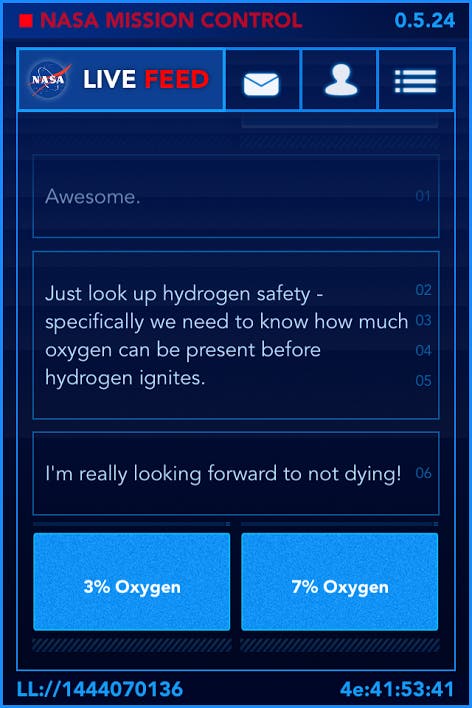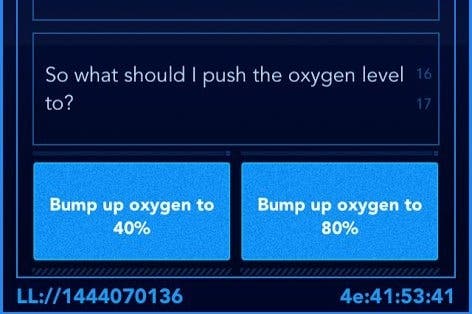The Martian: Bring Him Home is a licensed mobile game done right
Dark sols.
The Martian, both the Ridley Scott film and the Andy Weir novel it's based on, has been quite the hit lately. The story of a marooned astronaut solving a series of nearly impossible science problems in order to survive and make contact with his homeworld is a charming mixture of inspirational perseverance and outright horror. It's also the basis for a pretty smart mobile game with The Martian: Bring Him Home.
Bring Him Home doesn't place you in the rank space suit of stranded astronaut Mark Watney, however; probably because anyone who's read or watched his tale already knows how he solves his various challenges. (Also, because nobody wants to play a game where you grow potatoes by using your own fecal matter as manure.) Instead, Bring Him Home places the player in the role of Mission Control back at NASA, corresponding with the barely alive Watney "scienceing the s***" out of Mars (to put it in his words).

The Martian: Bring Him Home is primarily a linear text adventure, but there's some smart - albeit divisive - deviations from other visual novels like 80 Days. For one, Mark will often disappear to go handle various herculean tasks on his end. When this happens there's literally nothing to do in the game, so you just have to move on with your life and wait for him to contact you later - not unlike a Tamagotchi. The touch-and-go nature of your relationship to the game really grounds you in the fiction as you receive text from this fake person throughout the day. It can be a little annoying at times (you may want to silence your phone for the few days you're playing it), but it's a smart way of breaking the fourth wall that takes advantage of the portable communication-focused device that it's on.
Adding to the illusion of being Watney's sole correspondence is the fact that you also get emails from other science-minded folks with their own recommendations on how to advise the American Martian. Psychologists, engineers, chemists and more will chip in on the various challenges Watney faces. Many of these will be technical in nature, but some are more general, such as when a psychologist advises you to embrace Watney's gallows humour as he needs to laugh as a coping mechanism for his dreary plight.
Unlike most puzzle games, the answer to many of Bring Him Home's toughest questions aren't actually in the game. You'll have to consult your search engine of choice to suss out some scientific queries like how much Oxygen you need before things go kaboom. That's not exactly "fair" by most game design standards, but this is a minimalist alternate reality game, so asking players to go out there and learn more about reality seems in keeping with the game's overall theme: Learn science, stay alive.
In a game that's 99 per cent text, the writing quality is paramount and for the most part, developer Little Labs gets it right. It can occasionally veer too heavily into the goofier side of things (a gag where Mark mocks the Matt Damon character in "that old movie Interstellar" is particularly cringe-inducing), but the player's familiarity with the source material often grounds it. If you enter into Bring Him Home cold, some of the dialogue can feel overly casual; such as when Watney, a brilliant astronaut/scientist/reincarnated MacGuyver, says such crass phrases like "are you a dude or a chick?" Yet for most of the audience the wise-cracking Watney will be a familiar character, so the relaxed lingo doesn't feel as inauthentic as it might otherwise. As such, Bring Him Home may not be quite novel enough to function on its own, but it provides an entertaining supplement to something you're already versed in.
What interests me most about The Martian: Bring Him Home is the possibilities of interactive fiction where you're merely occupying a supporting role. While Watney's remote journey can be somewhat alienating, the premise is sound and it would be interesting to see other developers try their hand at a similar format. Imagine a drama where you have to talk a suicidal friend from giving up, or coming-of-age story where you're keeping in touch with a best friend who's just moved away? It didn't take long for "walking simulators" to catch on, so why not "talking simulators"? After all, some conversations can be very difficult to have.
Unlike Mark Watney's solitary trek through the red planet, The Martian: Bring Him Home is not the first of its kind, but it's a fine example of a studio merging its license with an unconventional design that fits its source material like a glove. Furthermore, at £2.29 / $2.99 with no in-app purchases it's not going to break the bank for those who want to relive Weir's story from another perspective glossed over in the movie and book. Ground control to Little Labs, you've really made the grade.


